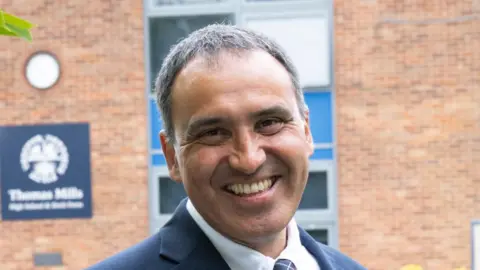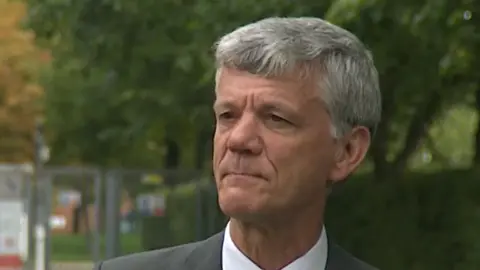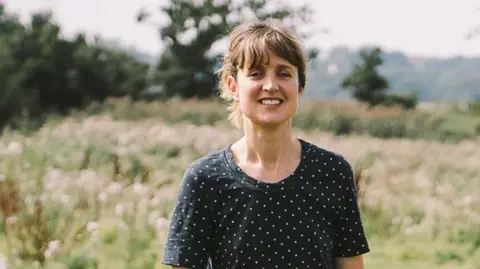Schools need more help with phone bans, says head
 Contributed
ContributedA head teacher who tightened rules around pupils' mobile phone use said more help was needed from the government to enforce restrictions.
Philip Hurst, the head of Thomas Mills High School and Sixth Form in Framlingham, Suffolk, changed the school's phone policy a year ago so devices were kept in lockers and "out of sight and out of mind".
He said the change had benefited students, but felt there was still an "uphill battle" to protect children from the dangers presented on social media.
The Department for Education (DfE) said it supported schools to "take the necessary steps to prevent disruption".
Mr Hurst said the new rules on mobile phones had "gone down very well" with his pupils and less phones were being confiscated.
He said children had told him they enjoyed socialising with each other and were "starting to feel less overwhelmed".
"I think there's an argument as to whether government should play a greater role because in some ways the arguments that apply for us, apply to every child, every school in the country," he said.
"Why are we having all these individual decisions and debates?"
Mr Hurst said he did not want to ban phones from a child's life, but added children today were facing tougher challenges thanks to smartphones and had "a right to be protected".
Different atmosphere

Unity Schools Partnership, a school's trust that runs tens of schools across Suffolk, Essex and Norfolk, recently announced it would be going smartphone free during the school day by September next year, after seeing the positive results from other schools.
"What we're seeing in the schools where the phones are looked after [by staff] in the school day is a different atmosphere, Tim Coulson, the chief executive of the trust said.
"We're seeing children reverting to the kind of behaviour during lunchtimes, playtimes, that we would all remember as adults where children are playing with each other rather than talking with each other via their social media accounts.
"We've spent a year thinking about it, we spent a year going to visit other schools, having a lot of debates across the head teachers across the schools, and have come to a view that this is the right and best thing to do with children."
 Alastair Bartlett/Tilt Shift Creative
Alastair Bartlett/Tilt Shift CreativeDaisy Greenwell, from Woodbridge, Suffolk, and co-founder of the Smartphone Free Childhood campaign, agreed with Mr Hurst and said she wanted to see a government mandate on the issue and funding to help schools.
"I completely agree the government needs to do more," she said.
"Right now they are so far behind where the public is on this issue - all polling and surveys around the country agree that schools should be smartphone free.
"When I was at school in the 1980s, Tamagotchis were banned because they were deemed too distracting and now we give kids pocket supercomputers and expect them to do trigonometry and not be on TikTok, it's crazy."
The DfE said schools already had the power to ban phones and there was "clear guidance" on how to restrict phone usage.
"Even before the guidance was introduced around 97% of schools were restricting mobile phone use, but we know that there are wider issues with children's online experiences, which is why we are also bringing in better protections from harmful content through the Online Safety Act," the spokesperson added.
Follow Suffolk news on BBC Sounds, Facebook, Instagram and X.
